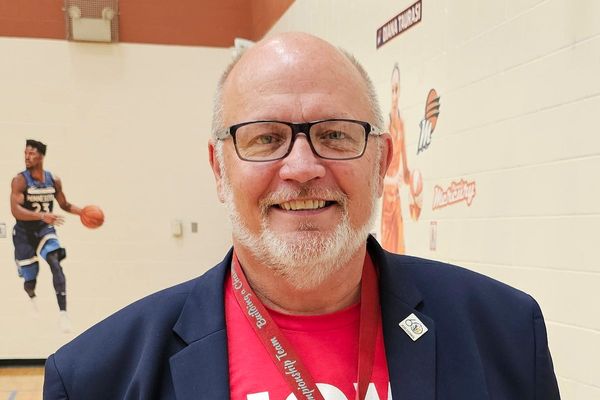As Queensland braces to hit the peak of its current COVID-19 Omicron wave within the week, health officials have reassured residents that hospital systems will cope with the influx of new cases.
Queensland so far has not seen as many cases or deaths as jurisdictions like New South Wales and Victoria.
Infectious diseases expert Paul Griffin said Queensland overall had "done well" in its handling of the Omicron wave.
"We've maintained reasonable hospital capacity and we've had relatively good outcomes, despite high numbers of cases," Dr Griffin said.
He attributed the state's success to a number of factors, including its dispersed population, ventilation in houses and buildings, and even the compliance of Queenslanders when it came to health orders like mask-wearing and vaccination.
"I think we're a state that seems to have lower risk of those really high rates of transmission that New South Wales and Victoria have seen," Dr Griffin said.
"But I think also we've got a population who inherently try to do the right thing and so in terms of mask-wearing and social distancing, on the whole, our state has tended to do quite well with those simple measures, so that's probably helped us to a degree as well."
'Vaccination is our most important strategy'
Queensland's vaccination rate was another factor Dr Griffin believed had helped Queensland avoid losing control of the virus.
"Our relatively high rate [of vaccinations] — although it seems to have plateaued a little bit at the moment — has certainly been a really big part of our relative success so far," he said.
"Vaccination is our most important strategy, predominantly for reducing the prospect of progressing to severe disease."
He said the high vaccination rates have also helped reduce the burden on Queensland's healthcare system and urged people to get their boosters.
"Vaccination — and particularly with boosters now — is really the main strategy there," he said.
'We had to open up at that time'
Dr Griffin said although it was unfortunate the opening of Queensland's border coincided with the introduction of Omicron into the community, it was crucial the state continued with its plan.
"Things perhaps escalated a little quicker than a lot of people predicted, but in the end, we had to open up then and if we had delayed that opening up, we'd still be facing a similar challenge just at a later point in time," he said.
"It's easy in retrospect to be critical but we had to open up at some point in time, and I think that was the right time.
"There's always opportunities to improve, and in my mind, the biggest opportunity we had was to be a little more prepared for a large amount of cases in our community."
Poor quality data making it difficult to predict peak
Delays at PCR testing clinics and the introduction of self-reporting rapid antigen tests (RATs) had made it difficult for health officials to predict exactly when the omicron wave would peak in Queensland.
"The quality of that data at the moment is quite poor, we are missing a lot of that data at the moment," he said.
"In terms of exactly when the peak will occur, how high it will be, it's really hard to predict because that type of data that we're relying on to make those predictions is pretty soft at the moment.
"I think it's very likely we're at or near the peak, probably on the Gold Coast and a little bit behind in Brisbane.
"Then other parts of Queensland might reach that peak at slightly different times, based on a number of other variables, but it does look like we are getting close now."
'We're not going to go back to zero'
Queenslanders can expect further waves once the peak subsides, especially coming in to winter.
Dr Griffin warned people not to get complacent, but rather learn to live with the virus.
"We have to remember that just because we pass the peak, doesn't mean that transmission stops occurring in our population," he said.
"It'll decline at approximately the same rate that it has increased and we're not going to go back to zero.
"Potentially another variant will be introduced to our population at some point in the future and we are going to have to continue to make sure we have some basic strategies in place and we don't get too complacent."
Dr Griffin said it would become easier to manage the virus as more tools such as new vaccines and oral treatments become available.
'Don't get complacent from here'
Dr Griffin said the pandemic could have hit Queensland a lot harder than it had if it were not for the measures in place.
"We certainly could have seen a much worse situation than we have with Omicron," he said.
"The community has been doing the right thing mostly, so I think we have done reasonably well.







